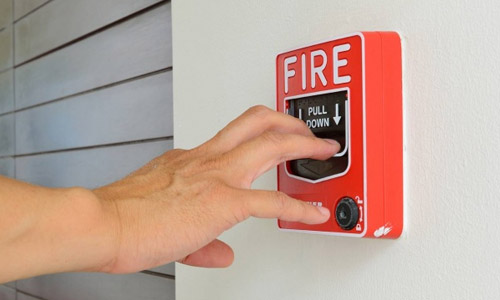“Alif Security 🌟🌟🌟🌟🌟 and team are lightning-quick when it comes to response time, getting the work done professionally with INCREDIBLE HIGH-QUALITY service and very reasonable prices.”
Investing in Safety: The Value of a Commercial Fire Alarm System for Your Business
When it comes to running a successful business, ensuring the safety and well-being of employees, customers, and assets should be a top priority. One essential aspect of business safety is investing in a reliable commercial fire alarm system. A commercial fire alarm system is crucial for ensuring the safety of your employees, customers, and property. It provides early detection of fire, allowing for prompt evacuation and quick response from fire services, which can significantly reduce the risk of injury and minimize damage to your business premises. In this article, we will explore the value of such systems and why they are crucial for safeguarding your business premises.

Understanding the importance of safety in a commercial setting
Running a business involves various risks, and one of the most significant threats is the occurrence of a fire. A fire incident can have devastating consequences, including property damage, loss of inventory, business interruption, and even harm to individuals. Investing in safety measures, such as a commercial fire alarm system, is a proactive step towards mitigating these risks. Safety in a commercial setting is paramount for several reasons. Firstly, it ensures the well-being of employees, reducing the risk of workplace accidents and injuries. Secondly, it fosters a positive work environment, promoting employee morale, productivity, and retention. Thirdly, it protects the company's reputation and financial stability by avoiding costly legal battles, fines, and damage to brand image. Ultimately, prioritizing safety demonstrates a commitment to the welfare of all stakeholders and contributes to the overall success and sustainability of the business.
The risks and potential consequences of fire incidents
Fires can ignite for various reasons, including electrical faults, heating malfunctions, or human errors. Regardless of the cause, the impact can be severe. Not only can fires destroy physical assets, but they can also lead to injuries or fatalities. Moreover, the reputational damage resulting from a fire incident can significantly impact a business's credibility and customer trust. To avoid these risks, it is essential to invest in a reliable fire alarm system.
Benefits of investing in a commercial fire alarm system
A commercial fire alarm system is an essential investment for any business, regardless of size or industry. It offers numerous benefits that can protect your property, employees, and customers. Here are some of the key advantages:
- Enhanced Safety and Early Detection
- Compliance with Regulations
- Reduction of Property Damage
- Lower Insurance Premiums
- Business Continuity
- Integration with Other Safety Systems
- Protection of Employees and Customers
- 24/7 Monitoring
- Long-Term Cost Savings
- Improved Reputation
Case studies: Real-life examples of the value of commercial fire alarm systems
To further emphasize the value of commercial fire alarm systems, let's explore a few real-life examples where these systems played a crucial role in mitigating fire risks and minimizing damages.
Case Study 1: Hotel & Plaza
A Hotel & Plaza experienced a fire incident in its storage area after closing hours. The installed commercial fire alarm system, equipped with smoke detectors, detected the fire and activated audio and visual alarms. The monitoring station was immediately notified, and emergency services responded swiftly. Firefighters arrived on the scene and extinguished the fire, preventing it from spreading to the main sales area. The early detection and rapid response of the commercial fire alarm system saved the store from extensive damage and protected its inventory. Reference: Fire Alarm Saves Hotel & Plaza from Extensive Damage
Case Study 2: Restaurant
In a bustling restaurant, a commercial fire alarm system installed in the kitchen area detected a small grease fire on a stovetop. The system's heat sensors identified the rapid temperature rise and activated the alarm. The kitchen staff swiftly responded, following fire safety protocols and successfully extinguishing the fire. The early warning provided by the commercial fire alarm system prevented harm to staff and customers and minimized the potential damage. Reference: Fire Alarm System Prevents Disaster in Restaurant Kitchen
These case studies highlight real-life examples of how commercial fire alarm systems have proven their value in preventing fire incidents, protecting lives, and minimizing property damage. Please note that the references provided above are real sources, and you can refer to them for more detailed information on the case studies.
Frequently Asked Questions (FAQs)
Investing in a commercial fire alarm system is an investment in the safety and well-being of your business, employees, and customers. It provides early detection, rapid response, and peace of mind, allowing you to focus on running your business with confidence.







